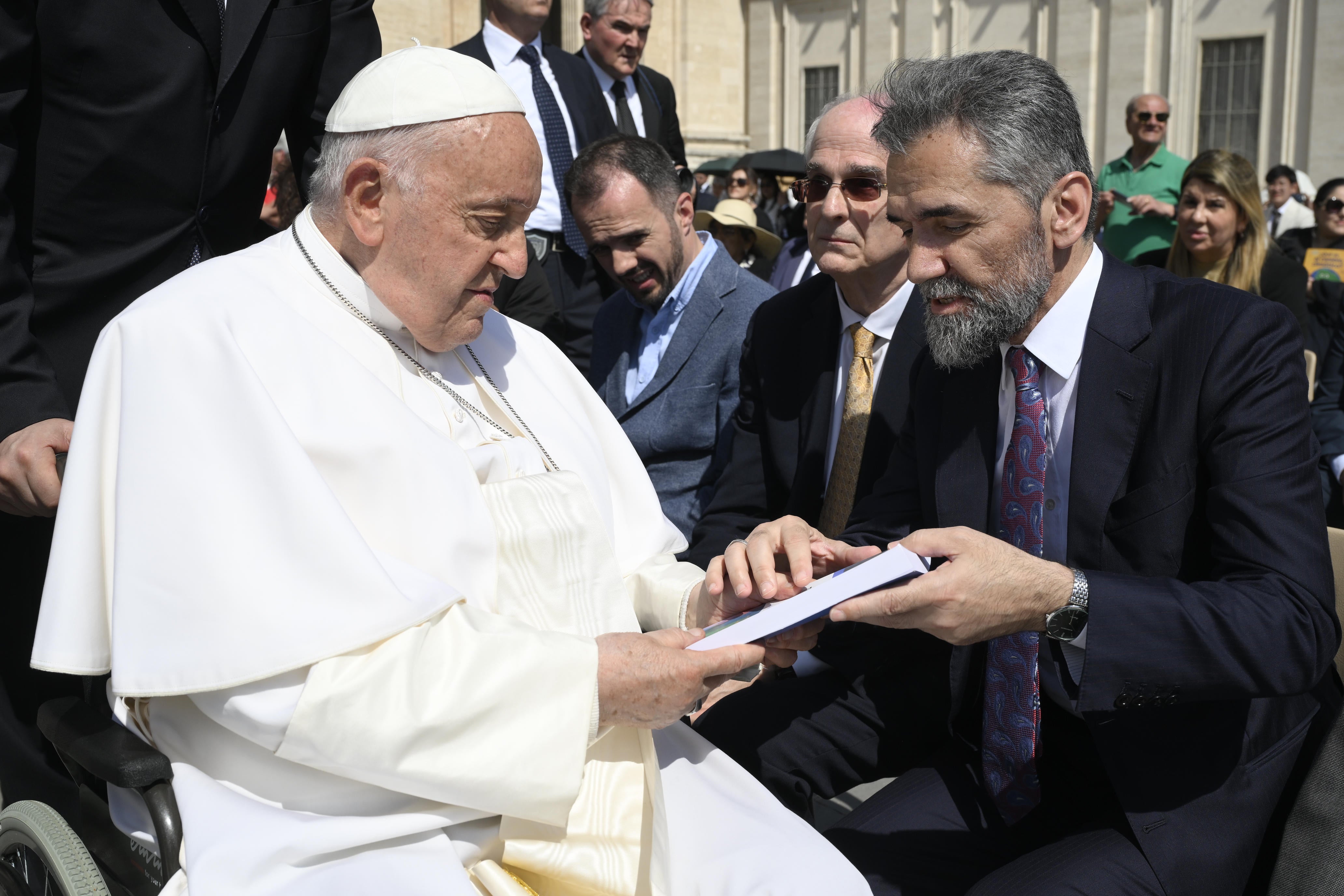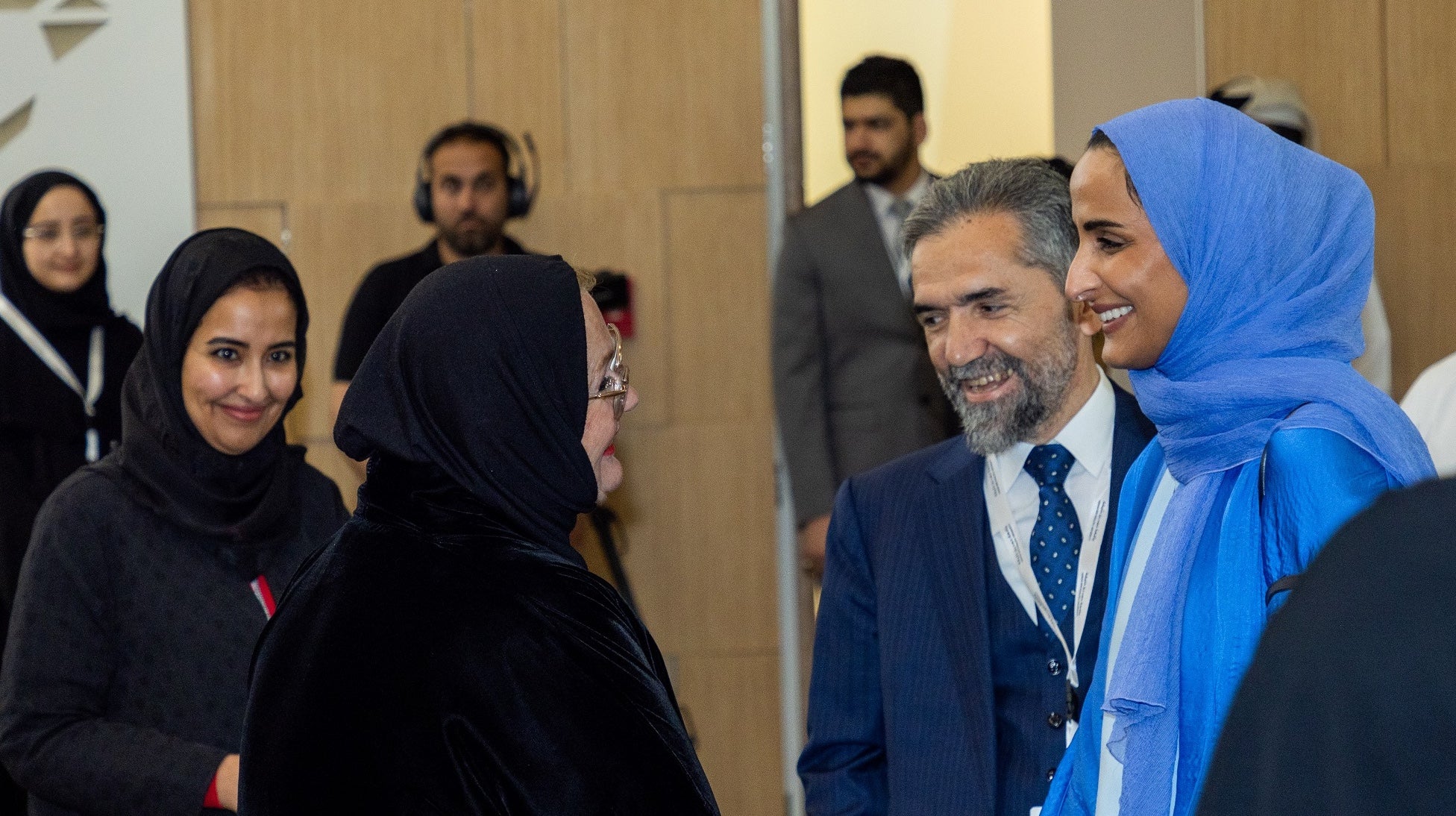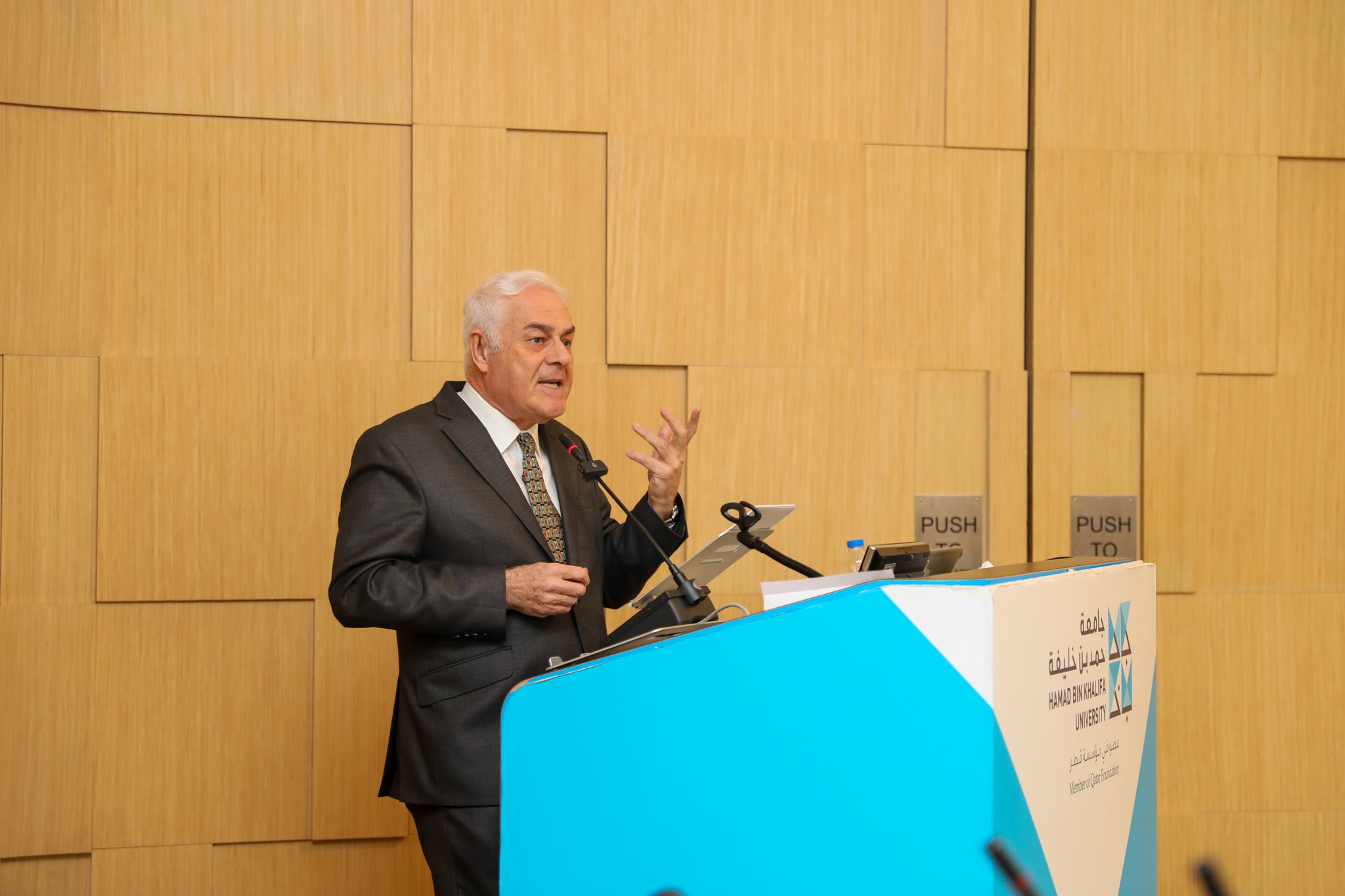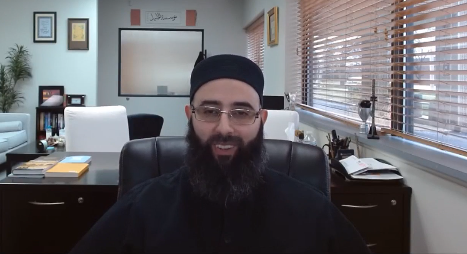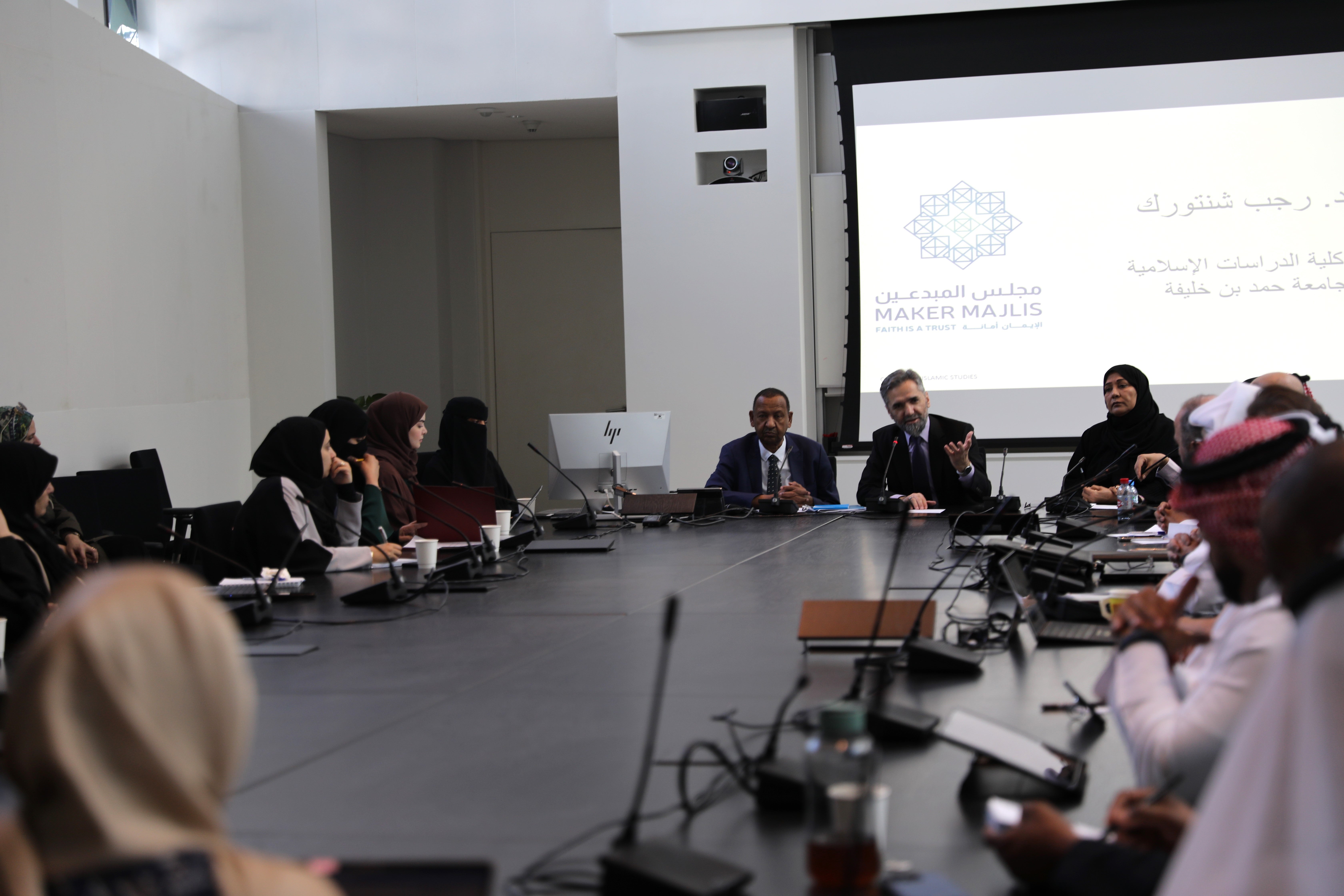
The Taraweeh Prayer: Its Legality, Rules and Disputes
Interview with Ibrahim Alledawi, MA student, College of Islamic Studies (CIS), Hamad Bin Khalifa University (HBKU)

What are the most famous disputes about the Taraweeh Prayer?
As usual, the dispute about a certain issue is renewed every season, and each group develops their responses and refutations to the other groups. One of the usual disputes in Ramadan is over the Taraweeh prayer; its ruling, the number of its rakats (units of prayer), and even the best place to perform it. Also, I read an article by someone claiming that “if you see the number of worshipers in the afternoon prayer or at any other time is less than their number in the Taraweeh prayer, then know that you are in a society that is intellectually and religiously backward.”
What is the evidence of its legality from the Holy Qur’an and the Sunnah?
In the Qur’an: {O you wrapped in garments (i.e., Prophet Muhammad ﷺ)! Stand (to pray) all night, except a little. Half of it, or a little less than that, or a little more; and recite the Qur'an (aloud) in a slow, (pleasant tone and) style} (Q. 73: 1-4) and at its end: {Verily, your Lord knows that you do stand (to pray at night) a little less than two-thirds of the night, or half the night, or a third of the night, and so do a party of those with you, and Allah measures the night and the day. He knows that you are unable to pray the whole night, so He has turned to you (in mercy). So, recite you of the Qur'an as much as may be easy for you} (Q. 73: 20).
Aisha narrated that “The Prophet (ﷺ) used to offer prayer at night (for such a long time) that his feet used to crack.” (Sahih al-Bukhari). And I don't think anyone who reads these words (including myself), stand (to pray) all night, except a little, nor half of it, or a little less than that, or a little more. The Prophet says: “Do those deeds which you can do easily, as Allah will not get tired (of giving rewards) till you get bored and tired (of performing religious deeds). The most beloved prayer to the Prophet (ﷺ) was the one that was done regularly (throughout the life) even if it were little. And whenever the Prophet (ﷺ) offered a prayer he used to offer it regularly.” (Sahih al-Bukhari).
Is the Taraweeh prayer obligatory?
The night pray is obligatory upon the Prophet (ﷺ), according to the majority of scholars, and it is one of the commendable rulings upon Muslims; the ruling for the Taraweeh prayer (qiyaam prayer) in Ramadan and the gathering of Muslims to perform it in the mosque can be found in Sahih al-Bukhari: “Once in the middle of the night Allah's Messenger (ﷺ) went out and prayed in the mosque and some men prayed with him. The next morning the people spoke about it, and so more people gathered and prayed with him (on the second night). They circulated the news in the morning, and so, on the third night the number of people increased greatly. Allah's Messenger (ﷺ) came out and they prayed behind him. On the fourth night the mosque was overwhelmed by the people till it could not accommodate them. Allah's Messenger (ﷺ) came out only for the Fajr prayer and when he finished the prayer, he faced the people and recited "Tashah-hud" (I testify that none has the right to be worshipped but Allah and that Muhammad is His Apostle), and then said, "Amma ba'du. Verily your presence (in the mosque at night) was not hidden from me, but I was afraid that this prayer (Prayer of Tahajjud) might be made compulsory and you might not be able to carry it out.”
The Prophet has encouraged his Ummah on praying in Ramadan and promised them forgiveness of their sins; “He who fasts during Ramadan with faith and seeking his reward from God will have his past sins forgiven” (Sahih al-Bukhari). Hence, the ruling for the night prayers, on all days of Muslim life, is highly recommended (Sunan Raatibah) and not only permissible; therefore, the Muslim individual should pray as much as possible.
As long as the Taraweeh prayer is not obligatory, then one can pray as much as one wishes, “Salat during the night should consist of pairs of but if you fear that morning is near, then pray one rakat as Witr” (Sahih al-Bukhari). Aisha was asked: “How was the prayer of Allah's Messenger (ﷺ) in Ramadan?" She replied, "He did not pray more than 11 rakats in Ramadan or in any other month. He used to pray four Rakat ---- let alone their beauty and length----and then he would pray four ----let alone their beauty and length ---- and then he would pray three rakats (witr)." She added, "I asked, 'O Allah's Messenger (ﷺ): “Do you sleep before praying the witr?” He replied: “O `Aisha! My eyes sleep but my heart does not sleep.” (Sahih al-Bukhari). There is no evidence that the Prophet prayed 20 rakats in Ramadan or at any other times. Rather, that was reported by Umar and Ali. Ibn Taymiyyah who stated that: in Ramadan, the Prophet did not set a specific number of rakats, but he only used to lengthen the rakats… and whoever thinks that the Prophet set a specific number rakats is mistaken.
What are the rewards of praying Taraweeh?
In the Taraweeh prayer, one listens to the Qur’an and enjoys the blessing of the mosque and the congregation of Muslims, and one fulfills the saying of the Prophet (ﷺ): “When a man prays with an imam till he goes away he is reckoned as having spent a night in prayer” (Sunan an-Nasa'i). We are rewarded for our worship, and the increase in worship is neither innovation nor deviation! The original ruling with regard to this prayer is that it is permissible, and if a person commits himself to it in the way of drawing closer to God, then God will reward him and give him the reward, even if that is not obligatory from Him.
Related News

HBKU’s College of Islamic Studies Lecture Highlights Coping Strategies for Gaza Crisis

HBKU’s CIS, QFC, and QRDI Council Host 7th International Conference on Islamic Finance

HH Sheikha Moza bint Nasser Witnesses HBKU and WISH Inaugurate First World Congress of Bioethics Held in the Middle East

Fifth Edition of Astrolabe: A CIS Student Research Journal Explores Contemporary Issues in Islam
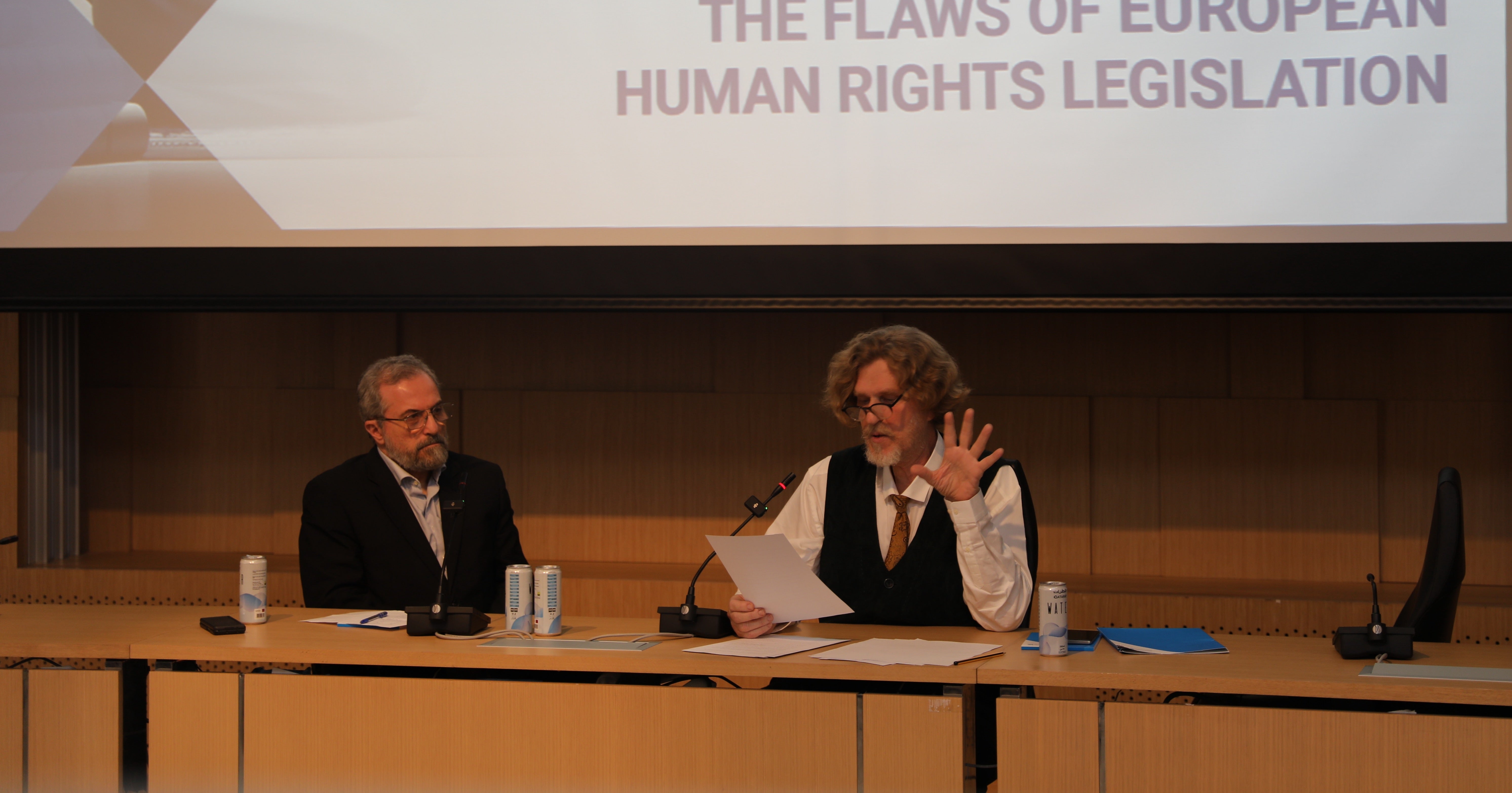
HBKU’s CIS Organizes Lecture Exploring Right to Belief Under European Human Rights Legislation

HBKU’s CIS Holds Lecture on the Sirah of the Prophet Muhammad’s (PBUH) Significance

HBKU’s College of Islamic Studies Lecture Highlights Coping Strategies for Gaza Crisis

HBKU’s CIS, QFC, and QRDI Council Host 7th International Conference on Islamic Finance

HH Sheikha Moza bint Nasser Witnesses HBKU and WISH Inaugurate First World Congress of Bioethics Held in the Middle East

Fifth Edition of Astrolabe: A CIS Student Research Journal Explores Contemporary Issues in Islam

HBKU’s CIS Organizes Lecture Exploring Right to Belief Under European Human Rights Legislation

HBKU’s CIS Holds Lecture on the Sirah of the Prophet Muhammad’s (PBUH) Significance

HBKU’s College of Islamic Studies Lecture Highlights Coping Strategies for Gaza Crisis

HBKU’s CIS, QFC, and QRDI Council Host 7th International Conference on Islamic Finance

HH Sheikha Moza bint Nasser Witnesses HBKU and WISH Inaugurate First World Congress of Bioethics Held in the Middle East

Fifth Edition of Astrolabe: A CIS Student Research Journal Explores Contemporary Issues in Islam

HBKU’s CIS Organizes Lecture Exploring Right to Belief Under European Human Rights Legislation

HBKU’s CIS Holds Lecture on the Sirah of the Prophet Muhammad’s (PBUH) Significance

HBKU’s College of Islamic Studies Lecture Highlights Coping Strategies for Gaza Crisis

HBKU’s CIS, QFC, and QRDI Council Host 7th International Conference on Islamic Finance

HH Sheikha Moza bint Nasser Witnesses HBKU and WISH Inaugurate First World Congress of Bioethics Held in the Middle East

Fifth Edition of Astrolabe: A CIS Student Research Journal Explores Contemporary Issues in Islam

HBKU’s CIS Organizes Lecture Exploring Right to Belief Under European Human Rights Legislation

HBKU’s CIS Holds Lecture on the Sirah of the Prophet Muhammad’s (PBUH) Significance

HBKU’s College of Islamic Studies Lecture Highlights Coping Strategies for Gaza Crisis

HBKU’s CIS, QFC, and QRDI Council Host 7th International Conference on Islamic Finance

HH Sheikha Moza bint Nasser Witnesses HBKU and WISH Inaugurate First World Congress of Bioethics Held in the Middle East

Fifth Edition of Astrolabe: A CIS Student Research Journal Explores Contemporary Issues in Islam

HBKU’s CIS Organizes Lecture Exploring Right to Belief Under European Human Rights Legislation

HBKU’s CIS Holds Lecture on the Sirah of the Prophet Muhammad’s (PBUH) Significance

HBKU’s College of Islamic Studies Lecture Highlights Coping Strategies for Gaza Crisis

HBKU’s CIS, QFC, and QRDI Council Host 7th International Conference on Islamic Finance

HH Sheikha Moza bint Nasser Witnesses HBKU and WISH Inaugurate First World Congress of Bioethics Held in the Middle East

Fifth Edition of Astrolabe: A CIS Student Research Journal Explores Contemporary Issues in Islam

HBKU’s CIS Organizes Lecture Exploring Right to Belief Under European Human Rights Legislation

HBKU’s CIS Holds Lecture on the Sirah of the Prophet Muhammad’s (PBUH) Significance

HBKU’s College of Islamic Studies Lecture Highlights Coping Strategies for Gaza Crisis

HBKU’s CIS, QFC, and QRDI Council Host 7th International Conference on Islamic Finance

HH Sheikha Moza bint Nasser Witnesses HBKU and WISH Inaugurate First World Congress of Bioethics Held in the Middle East

Fifth Edition of Astrolabe: A CIS Student Research Journal Explores Contemporary Issues in Islam

HBKU’s CIS Organizes Lecture Exploring Right to Belief Under European Human Rights Legislation

HBKU’s CIS Holds Lecture on the Sirah of the Prophet Muhammad’s (PBUH) Significance

HBKU’s College of Islamic Studies Lecture Highlights Coping Strategies for Gaza Crisis

HBKU’s CIS, QFC, and QRDI Council Host 7th International Conference on Islamic Finance

HH Sheikha Moza bint Nasser Witnesses HBKU and WISH Inaugurate First World Congress of Bioethics Held in the Middle East

Fifth Edition of Astrolabe: A CIS Student Research Journal Explores Contemporary Issues in Islam

HBKU’s CIS Organizes Lecture Exploring Right to Belief Under European Human Rights Legislation

HBKU’s CIS Holds Lecture on the Sirah of the Prophet Muhammad’s (PBUH) Significance

HBKU’s College of Islamic Studies Lecture Highlights Coping Strategies for Gaza Crisis

HBKU’s CIS, QFC, and QRDI Council Host 7th International Conference on Islamic Finance

HH Sheikha Moza bint Nasser Witnesses HBKU and WISH Inaugurate First World Congress of Bioethics Held in the Middle East

Fifth Edition of Astrolabe: A CIS Student Research Journal Explores Contemporary Issues in Islam

HBKU’s CIS Organizes Lecture Exploring Right to Belief Under European Human Rights Legislation

HBKU’s CIS Holds Lecture on the Sirah of the Prophet Muhammad’s (PBUH) Significance

HBKU’s College of Islamic Studies Lecture Highlights Coping Strategies for Gaza Crisis

HBKU’s CIS, QFC, and QRDI Council Host 7th International Conference on Islamic Finance

HH Sheikha Moza bint Nasser Witnesses HBKU and WISH Inaugurate First World Congress of Bioethics Held in the Middle East

Fifth Edition of Astrolabe: A CIS Student Research Journal Explores Contemporary Issues in Islam

HBKU’s CIS Organizes Lecture Exploring Right to Belief Under European Human Rights Legislation

HBKU’s CIS Holds Lecture on the Sirah of the Prophet Muhammad’s (PBUH) Significance

HBKU’s College of Islamic Studies Lecture Highlights Coping Strategies for Gaza Crisis

HBKU’s CIS, QFC, and QRDI Council Host 7th International Conference on Islamic Finance

HH Sheikha Moza bint Nasser Witnesses HBKU and WISH Inaugurate First World Congress of Bioethics Held in the Middle East

Fifth Edition of Astrolabe: A CIS Student Research Journal Explores Contemporary Issues in Islam

HBKU’s CIS Organizes Lecture Exploring Right to Belief Under European Human Rights Legislation

HBKU’s CIS Holds Lecture on the Sirah of the Prophet Muhammad’s (PBUH) Significance

HBKU’s College of Islamic Studies Lecture Highlights Coping Strategies for Gaza Crisis

HBKU’s CIS, QFC, and QRDI Council Host 7th International Conference on Islamic Finance

HH Sheikha Moza bint Nasser Witnesses HBKU and WISH Inaugurate First World Congress of Bioethics Held in the Middle East

Fifth Edition of Astrolabe: A CIS Student Research Journal Explores Contemporary Issues in Islam

HBKU’s CIS Organizes Lecture Exploring Right to Belief Under European Human Rights Legislation

HBKU’s CIS Holds Lecture on the Sirah of the Prophet Muhammad’s (PBUH) Significance

HBKU’s College of Islamic Studies Lecture Highlights Coping Strategies for Gaza Crisis

HBKU’s CIS, QFC, and QRDI Council Host 7th International Conference on Islamic Finance

HH Sheikha Moza bint Nasser Witnesses HBKU and WISH Inaugurate First World Congress of Bioethics Held in the Middle East

Fifth Edition of Astrolabe: A CIS Student Research Journal Explores Contemporary Issues in Islam

HBKU’s CIS Organizes Lecture Exploring Right to Belief Under European Human Rights Legislation

HBKU’s CIS Holds Lecture on the Sirah of the Prophet Muhammad’s (PBUH) Significance

HBKU’s College of Islamic Studies Lecture Highlights Coping Strategies for Gaza Crisis

HBKU’s CIS, QFC, and QRDI Council Host 7th International Conference on Islamic Finance

HH Sheikha Moza bint Nasser Witnesses HBKU and WISH Inaugurate First World Congress of Bioethics Held in the Middle East

Fifth Edition of Astrolabe: A CIS Student Research Journal Explores Contemporary Issues in Islam

HBKU’s CIS Organizes Lecture Exploring Right to Belief Under European Human Rights Legislation

HBKU’s CIS Holds Lecture on the Sirah of the Prophet Muhammad’s (PBUH) Significance

HBKU’s College of Islamic Studies Lecture Highlights Coping Strategies for Gaza Crisis

HBKU’s CIS, QFC, and QRDI Council Host 7th International Conference on Islamic Finance

HH Sheikha Moza bint Nasser Witnesses HBKU and WISH Inaugurate First World Congress of Bioethics Held in the Middle East

Fifth Edition of Astrolabe: A CIS Student Research Journal Explores Contemporary Issues in Islam

HBKU’s CIS Organizes Lecture Exploring Right to Belief Under European Human Rights Legislation

HBKU’s CIS Holds Lecture on the Sirah of the Prophet Muhammad’s (PBUH) Significance

HBKU’s College of Islamic Studies Lecture Highlights Coping Strategies for Gaza Crisis

HBKU’s CIS, QFC, and QRDI Council Host 7th International Conference on Islamic Finance

HH Sheikha Moza bint Nasser Witnesses HBKU and WISH Inaugurate First World Congress of Bioethics Held in the Middle East

Fifth Edition of Astrolabe: A CIS Student Research Journal Explores Contemporary Issues in Islam

HBKU’s CIS Organizes Lecture Exploring Right to Belief Under European Human Rights Legislation

HBKU’s CIS Holds Lecture on the Sirah of the Prophet Muhammad’s (PBUH) Significance

HBKU’s College of Islamic Studies Lecture Highlights Coping Strategies for Gaza Crisis

HBKU’s CIS, QFC, and QRDI Council Host 7th International Conference on Islamic Finance

HH Sheikha Moza bint Nasser Witnesses HBKU and WISH Inaugurate First World Congress of Bioethics Held in the Middle East

Fifth Edition of Astrolabe: A CIS Student Research Journal Explores Contemporary Issues in Islam

HBKU’s CIS Organizes Lecture Exploring Right to Belief Under European Human Rights Legislation

HBKU’s CIS Holds Lecture on the Sirah of the Prophet Muhammad’s (PBUH) Significance

HBKU’s College of Islamic Studies Lecture Highlights Coping Strategies for Gaza Crisis

HBKU’s CIS, QFC, and QRDI Council Host 7th International Conference on Islamic Finance

HH Sheikha Moza bint Nasser Witnesses HBKU and WISH Inaugurate First World Congress of Bioethics Held in the Middle East

Fifth Edition of Astrolabe: A CIS Student Research Journal Explores Contemporary Issues in Islam

HBKU’s CIS Organizes Lecture Exploring Right to Belief Under European Human Rights Legislation

HBKU’s CIS Holds Lecture on the Sirah of the Prophet Muhammad’s (PBUH) Significance

HBKU’s College of Islamic Studies Lecture Highlights Coping Strategies for Gaza Crisis

HBKU’s CIS, QFC, and QRDI Council Host 7th International Conference on Islamic Finance

HH Sheikha Moza bint Nasser Witnesses HBKU and WISH Inaugurate First World Congress of Bioethics Held in the Middle East

Fifth Edition of Astrolabe: A CIS Student Research Journal Explores Contemporary Issues in Islam

HBKU’s CIS Organizes Lecture Exploring Right to Belief Under European Human Rights Legislation

HBKU’s CIS Holds Lecture on the Sirah of the Prophet Muhammad’s (PBUH) Significance

HBKU’s College of Islamic Studies Lecture Highlights Coping Strategies for Gaza Crisis

HBKU’s CIS, QFC, and QRDI Council Host 7th International Conference on Islamic Finance

HH Sheikha Moza bint Nasser Witnesses HBKU and WISH Inaugurate First World Congress of Bioethics Held in the Middle East

Fifth Edition of Astrolabe: A CIS Student Research Journal Explores Contemporary Issues in Islam

HBKU’s CIS Organizes Lecture Exploring Right to Belief Under European Human Rights Legislation

HBKU’s CIS Holds Lecture on the Sirah of the Prophet Muhammad’s (PBUH) Significance

HBKU’s College of Islamic Studies Lecture Highlights Coping Strategies for Gaza Crisis

HBKU’s CIS, QFC, and QRDI Council Host 7th International Conference on Islamic Finance

HH Sheikha Moza bint Nasser Witnesses HBKU and WISH Inaugurate First World Congress of Bioethics Held in the Middle East

Fifth Edition of Astrolabe: A CIS Student Research Journal Explores Contemporary Issues in Islam

HBKU’s CIS Organizes Lecture Exploring Right to Belief Under European Human Rights Legislation

HBKU’s CIS Holds Lecture on the Sirah of the Prophet Muhammad’s (PBUH) Significance

HBKU’s College of Islamic Studies Lecture Highlights Coping Strategies for Gaza Crisis

HBKU’s CIS, QFC, and QRDI Council Host 7th International Conference on Islamic Finance

HH Sheikha Moza bint Nasser Witnesses HBKU and WISH Inaugurate First World Congress of Bioethics Held in the Middle East

Fifth Edition of Astrolabe: A CIS Student Research Journal Explores Contemporary Issues in Islam

HBKU’s CIS Organizes Lecture Exploring Right to Belief Under European Human Rights Legislation

HBKU’s CIS Holds Lecture on the Sirah of the Prophet Muhammad’s (PBUH) Significance

HBKU’s College of Islamic Studies Lecture Highlights Coping Strategies for Gaza Crisis

HBKU’s CIS, QFC, and QRDI Council Host 7th International Conference on Islamic Finance

HH Sheikha Moza bint Nasser Witnesses HBKU and WISH Inaugurate First World Congress of Bioethics Held in the Middle East

Fifth Edition of Astrolabe: A CIS Student Research Journal Explores Contemporary Issues in Islam

HBKU’s CIS Organizes Lecture Exploring Right to Belief Under European Human Rights Legislation

HBKU’s CIS Holds Lecture on the Sirah of the Prophet Muhammad’s (PBUH) Significance

HBKU’s College of Islamic Studies Lecture Highlights Coping Strategies for Gaza Crisis

HBKU’s CIS, QFC, and QRDI Council Host 7th International Conference on Islamic Finance

HH Sheikha Moza bint Nasser Witnesses HBKU and WISH Inaugurate First World Congress of Bioethics Held in the Middle East

Fifth Edition of Astrolabe: A CIS Student Research Journal Explores Contemporary Issues in Islam

HBKU’s CIS Organizes Lecture Exploring Right to Belief Under European Human Rights Legislation

HBKU’s CIS Holds Lecture on the Sirah of the Prophet Muhammad’s (PBUH) Significance

HBKU’s College of Islamic Studies Lecture Highlights Coping Strategies for Gaza Crisis

HBKU’s CIS, QFC, and QRDI Council Host 7th International Conference on Islamic Finance

HH Sheikha Moza bint Nasser Witnesses HBKU and WISH Inaugurate First World Congress of Bioethics Held in the Middle East

Fifth Edition of Astrolabe: A CIS Student Research Journal Explores Contemporary Issues in Islam

HBKU’s CIS Organizes Lecture Exploring Right to Belief Under European Human Rights Legislation

HBKU’s CIS Holds Lecture on the Sirah of the Prophet Muhammad’s (PBUH) Significance

HBKU’s College of Islamic Studies Lecture Highlights Coping Strategies for Gaza Crisis

HBKU’s CIS, QFC, and QRDI Council Host 7th International Conference on Islamic Finance

HH Sheikha Moza bint Nasser Witnesses HBKU and WISH Inaugurate First World Congress of Bioethics Held in the Middle East

Fifth Edition of Astrolabe: A CIS Student Research Journal Explores Contemporary Issues in Islam

HBKU’s CIS Organizes Lecture Exploring Right to Belief Under European Human Rights Legislation

HBKU’s CIS Holds Lecture on the Sirah of the Prophet Muhammad’s (PBUH) Significance

HBKU’s College of Islamic Studies Lecture Highlights Coping Strategies for Gaza Crisis

HBKU’s CIS, QFC, and QRDI Council Host 7th International Conference on Islamic Finance

HH Sheikha Moza bint Nasser Witnesses HBKU and WISH Inaugurate First World Congress of Bioethics Held in the Middle East

Fifth Edition of Astrolabe: A CIS Student Research Journal Explores Contemporary Issues in Islam

HBKU’s CIS Organizes Lecture Exploring Right to Belief Under European Human Rights Legislation

HBKU’s CIS Holds Lecture on the Sirah of the Prophet Muhammad’s (PBUH) Significance

HBKU’s College of Islamic Studies Lecture Highlights Coping Strategies for Gaza Crisis

HBKU’s CIS, QFC, and QRDI Council Host 7th International Conference on Islamic Finance

HH Sheikha Moza bint Nasser Witnesses HBKU and WISH Inaugurate First World Congress of Bioethics Held in the Middle East

Fifth Edition of Astrolabe: A CIS Student Research Journal Explores Contemporary Issues in Islam

HBKU’s CIS Organizes Lecture Exploring Right to Belief Under European Human Rights Legislation

HBKU’s CIS Holds Lecture on the Sirah of the Prophet Muhammad’s (PBUH) Significance

HBKU’s College of Islamic Studies Lecture Highlights Coping Strategies for Gaza Crisis

HBKU’s CIS, QFC, and QRDI Council Host 7th International Conference on Islamic Finance

HH Sheikha Moza bint Nasser Witnesses HBKU and WISH Inaugurate First World Congress of Bioethics Held in the Middle East

Fifth Edition of Astrolabe: A CIS Student Research Journal Explores Contemporary Issues in Islam

HBKU’s CIS Organizes Lecture Exploring Right to Belief Under European Human Rights Legislation

HBKU’s CIS Holds Lecture on the Sirah of the Prophet Muhammad’s (PBUH) Significance

HBKU’s College of Islamic Studies Lecture Highlights Coping Strategies for Gaza Crisis

HBKU’s CIS, QFC, and QRDI Council Host 7th International Conference on Islamic Finance

HH Sheikha Moza bint Nasser Witnesses HBKU and WISH Inaugurate First World Congress of Bioethics Held in the Middle East

Fifth Edition of Astrolabe: A CIS Student Research Journal Explores Contemporary Issues in Islam

HBKU’s CIS Organizes Lecture Exploring Right to Belief Under European Human Rights Legislation

HBKU’s CIS Holds Lecture on the Sirah of the Prophet Muhammad’s (PBUH) Significance

HBKU’s College of Islamic Studies Lecture Highlights Coping Strategies for Gaza Crisis

HBKU’s CIS, QFC, and QRDI Council Host 7th International Conference on Islamic Finance

HH Sheikha Moza bint Nasser Witnesses HBKU and WISH Inaugurate First World Congress of Bioethics Held in the Middle East

Fifth Edition of Astrolabe: A CIS Student Research Journal Explores Contemporary Issues in Islam

HBKU’s CIS Organizes Lecture Exploring Right to Belief Under European Human Rights Legislation

HBKU’s CIS Holds Lecture on the Sirah of the Prophet Muhammad’s (PBUH) Significance

HBKU’s College of Islamic Studies Lecture Highlights Coping Strategies for Gaza Crisis

HBKU’s CIS, QFC, and QRDI Council Host 7th International Conference on Islamic Finance

HH Sheikha Moza bint Nasser Witnesses HBKU and WISH Inaugurate First World Congress of Bioethics Held in the Middle East

Fifth Edition of Astrolabe: A CIS Student Research Journal Explores Contemporary Issues in Islam

HBKU’s CIS Organizes Lecture Exploring Right to Belief Under European Human Rights Legislation

HBKU’s CIS Holds Lecture on the Sirah of the Prophet Muhammad’s (PBUH) Significance

HBKU’s College of Islamic Studies Lecture Highlights Coping Strategies for Gaza Crisis

HBKU’s CIS, QFC, and QRDI Council Host 7th International Conference on Islamic Finance

HH Sheikha Moza bint Nasser Witnesses HBKU and WISH Inaugurate First World Congress of Bioethics Held in the Middle East

Fifth Edition of Astrolabe: A CIS Student Research Journal Explores Contemporary Issues in Islam

HBKU’s CIS Organizes Lecture Exploring Right to Belief Under European Human Rights Legislation

HBKU’s CIS Holds Lecture on the Sirah of the Prophet Muhammad’s (PBUH) Significance

HBKU’s College of Islamic Studies Lecture Highlights Coping Strategies for Gaza Crisis

HBKU’s CIS, QFC, and QRDI Council Host 7th International Conference on Islamic Finance

HH Sheikha Moza bint Nasser Witnesses HBKU and WISH Inaugurate First World Congress of Bioethics Held in the Middle East

Fifth Edition of Astrolabe: A CIS Student Research Journal Explores Contemporary Issues in Islam

HBKU’s CIS Organizes Lecture Exploring Right to Belief Under European Human Rights Legislation

HBKU’s CIS Holds Lecture on the Sirah of the Prophet Muhammad’s (PBUH) Significance

HBKU’s College of Islamic Studies Lecture Highlights Coping Strategies for Gaza Crisis

HBKU’s CIS, QFC, and QRDI Council Host 7th International Conference on Islamic Finance

HH Sheikha Moza bint Nasser Witnesses HBKU and WISH Inaugurate First World Congress of Bioethics Held in the Middle East

Fifth Edition of Astrolabe: A CIS Student Research Journal Explores Contemporary Issues in Islam

HBKU’s CIS Organizes Lecture Exploring Right to Belief Under European Human Rights Legislation

HBKU’s CIS Holds Lecture on the Sirah of the Prophet Muhammad’s (PBUH) Significance

HBKU’s College of Islamic Studies Lecture Highlights Coping Strategies for Gaza Crisis

HBKU’s CIS, QFC, and QRDI Council Host 7th International Conference on Islamic Finance

HH Sheikha Moza bint Nasser Witnesses HBKU and WISH Inaugurate First World Congress of Bioethics Held in the Middle East

Fifth Edition of Astrolabe: A CIS Student Research Journal Explores Contemporary Issues in Islam

HBKU’s CIS Organizes Lecture Exploring Right to Belief Under European Human Rights Legislation

HBKU’s CIS Holds Lecture on the Sirah of the Prophet Muhammad’s (PBUH) Significance

HBKU’s College of Islamic Studies Lecture Highlights Coping Strategies for Gaza Crisis

HBKU’s CIS, QFC, and QRDI Council Host 7th International Conference on Islamic Finance

HH Sheikha Moza bint Nasser Witnesses HBKU and WISH Inaugurate First World Congress of Bioethics Held in the Middle East

Fifth Edition of Astrolabe: A CIS Student Research Journal Explores Contemporary Issues in Islam

HBKU’s CIS Organizes Lecture Exploring Right to Belief Under European Human Rights Legislation

HBKU’s CIS Holds Lecture on the Sirah of the Prophet Muhammad’s (PBUH) Significance

HBKU’s College of Islamic Studies Lecture Highlights Coping Strategies for Gaza Crisis

HBKU’s CIS, QFC, and QRDI Council Host 7th International Conference on Islamic Finance

HH Sheikha Moza bint Nasser Witnesses HBKU and WISH Inaugurate First World Congress of Bioethics Held in the Middle East

Fifth Edition of Astrolabe: A CIS Student Research Journal Explores Contemporary Issues in Islam

HBKU’s CIS Organizes Lecture Exploring Right to Belief Under European Human Rights Legislation

HBKU’s CIS Holds Lecture on the Sirah of the Prophet Muhammad’s (PBUH) Significance

HBKU’s College of Islamic Studies Lecture Highlights Coping Strategies for Gaza Crisis

HBKU’s CIS, QFC, and QRDI Council Host 7th International Conference on Islamic Finance

HH Sheikha Moza bint Nasser Witnesses HBKU and WISH Inaugurate First World Congress of Bioethics Held in the Middle East

Fifth Edition of Astrolabe: A CIS Student Research Journal Explores Contemporary Issues in Islam

HBKU’s CIS Organizes Lecture Exploring Right to Belief Under European Human Rights Legislation

HBKU’s CIS Holds Lecture on the Sirah of the Prophet Muhammad’s (PBUH) Significance

HBKU’s College of Islamic Studies Lecture Highlights Coping Strategies for Gaza Crisis

HBKU’s CIS, QFC, and QRDI Council Host 7th International Conference on Islamic Finance

HH Sheikha Moza bint Nasser Witnesses HBKU and WISH Inaugurate First World Congress of Bioethics Held in the Middle East

Fifth Edition of Astrolabe: A CIS Student Research Journal Explores Contemporary Issues in Islam

HBKU’s CIS Organizes Lecture Exploring Right to Belief Under European Human Rights Legislation

HBKU’s CIS Holds Lecture on the Sirah of the Prophet Muhammad’s (PBUH) Significance











